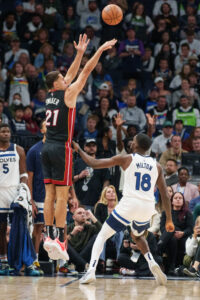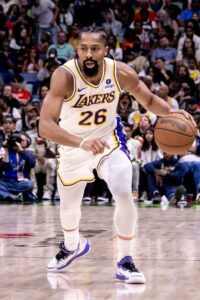South Sudan’s remarkable run to the Olympics ended Saturday with a loss to Serbia, but the small nation plans to be a power on the international basketball scene for years to come, writes Gary Washburn of The Boston Globe. South Sudan gained its independence 11 years ago and didn’t participate in its first AfroBasket tournament until 2021. It earned a spot in last year’s FIBA World Cup, where it qualified for the Olympics by finishing 17th, the highest of any African country.
The most significant names in building South Sudanese basketball are former NBA players Luol Deng, who financed and oversaw the creation of the team, and Royal Ivey, who serves as head coach. Ivey, an assistant with the Rockets, compares the experience, which included a victory over Puerto Rico in the team’s Olympic debut, to being in a movie.
“A lot of hard work, togetherness, commitment from the president to bring these guys together,” he said. “There were a lot of years where we weren’t productive. [Three] years ago, we were at AfroBasket. I didn’t have the same amount of talent. I was able to conjugate all this talent and now we’re rolling. We’ve got a style of play and it’s been fun.”
Ivey admits that building a competitive program hasn’t been easy given the limitations in South Sudan. There are no indoor basketball courts in the country, so his team had to train in Rwanda, which meant long plane rides and flight delays, but the experience brought the team closer.
“These guys are brothers. It’s a band of brothers,” Ivey said. “It’s a togetherness. They play cards together. They play dominoes together. We eat together. It’s communal. Guys love each other. When guys are doing wrong, we hold guys accountable. That’s what real team is. And that’s what real family is. That’s what family looks like, South Sudan.”
There’s more from Paris:
- Deng was incensed after Saturday’s loss, pointing to a disparity in foul calls that resulted in a 31-6 free throw advantage for Serbia, relays Sam Amick of The Athletic. Deng also objected to the fact that there’s only one referee from Africa among the Olympics’ 30-person officiating crew. “I don’t know why there (are) no African referees in the Olympics,” he said. “It’s 2024. I don’t know what’s the reason for that. You can say whatever you want to say, but if we’re representing the continent then we’ve got to be representing it fully.”
- Joel Embiid has been getting booed throughout the Olympics because he opted to play for Team USA rather than France, but he explained to reporters, including Joe Vardon of The Athletic, that familiarity with his American teammates played an important role in his choice. “It was a tough decision, but it is all about comfort level, and like I said, I’ve known these guys (Team USA players) for a long time and I just felt more comfortable than on the other side (France),” Embiid said. “There was some concern with the other side. Comfort level was huge. I always say I’m going to be where I’m wanted and these guys wanted me.”
- Canadian head coach Jordi Fernandez talked to Marc J. Spears of Andscape about the experience of trying to bring the country its first Olympic basketball medal. “The support has been unbelievable and these guys deserve it,” Fernandez said. “The program needs it. All I can say is thanks because we’ve been very supported by the country. And basketball now is one of the fastest growing pro sports in Canada.”

 “We welcome having Spencer back with us in Dallas,” Mavericks GM Nico Harrison said in a statement. “Spencer is an experienced teammate, who understands what we are trying to accomplish. His energy, versatility, and playmaking from the guard position adds invaluable depth to our roster and leaves us well positioned going into next season.”
“We welcome having Spencer back with us in Dallas,” Mavericks GM Nico Harrison said in a statement. “Spencer is an experienced teammate, who understands what we are trying to accomplish. His energy, versatility, and playmaking from the guard position adds invaluable depth to our roster and leaves us well positioned going into next season.”